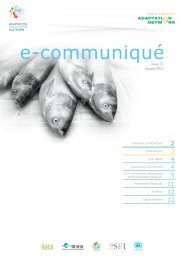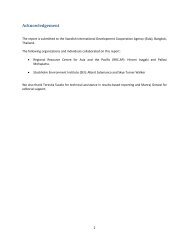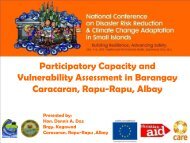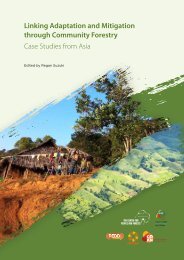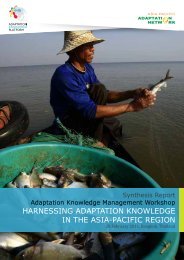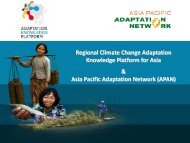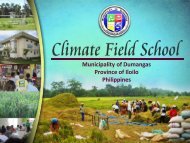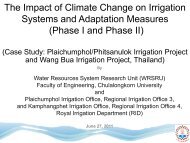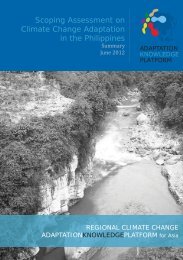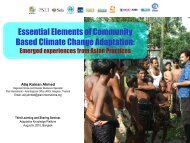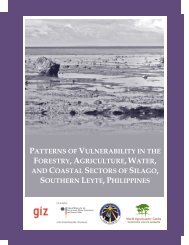Desktop Study on - Regional Climate Change Adaptation ...
Desktop Study on - Regional Climate Change Adaptation ...
Desktop Study on - Regional Climate Change Adaptation ...
Create successful ePaper yourself
Turn your PDF publications into a flip-book with our unique Google optimized e-Paper software.
Assessment of Capacity Gaps and Needs of South East Asia Countries<br />
in Addressing Impacts, Vulnerability and Adaptati<strong>on</strong> to <strong>Climate</strong> Variability and <strong>Climate</strong> <strong>Change</strong><br />
adopti<strong>on</strong> of appropriate adaptati<strong>on</strong> strategies. In<br />
order to increase the ability of the farmers to access<br />
and adopt alternative adaptati<strong>on</strong> practices, it is<br />
necessary to c<strong>on</strong>duct scientific research <strong>on</strong> socioec<strong>on</strong>omic,<br />
political and instituti<strong>on</strong>al structure in<br />
which the most vulnerable are placed.<br />
In additi<strong>on</strong>, cost-benefit analysis of potential<br />
adaptati<strong>on</strong> strategies needs to be implemented for<br />
strengthening the adaptive capacity of stakeholders.<br />
As described in the study of PCW, the challenge is<br />
to make all the stakeholders agree <strong>on</strong> the real risks<br />
related to climate change and steps necessary to<br />
reduce them. In order to enhance the capacity of<br />
facilitati<strong>on</strong> and decisi<strong>on</strong>-making between and am<strong>on</strong>g<br />
the stakeholders, it is recommended that scientific<br />
research be focused <strong>on</strong> priority-based interests<br />
and the cost involved that needs to be borne by the<br />
stakeholders, <strong>on</strong>ce the strategy is implemented.<br />
Scientific research c<strong>on</strong>ducted by Lansigan (2000) and<br />
IRRI (2009) highlights importance of understanding<br />
of changing envir<strong>on</strong>ments between and within<br />
human and natural systems. The assessment <strong>on</strong><br />
vulnerability of crops and crop producti<strong>on</strong> system<br />
is inevitable for building adaptati<strong>on</strong> strategies of the<br />
agriculture sector. However, the scientific insight into<br />
vulnerability of people and local communities needs<br />
more attenti<strong>on</strong> since it is the farmers and farming<br />
communities that implement adaptati<strong>on</strong> practices to<br />
reduce vulnerability of crops. The poor communities<br />
vulnerable to the changing socio-ec<strong>on</strong>omic, political<br />
and instituti<strong>on</strong>al systems may maintain to plant<br />
crops vulnerable to climate variability due to the<br />
lack of access to new rice species.<br />
Increasing rice producti<strong>on</strong> in areas that are highly<br />
vulnerable to climate variability through planting<br />
genetically modified rice varieties is introduced as<br />
an adaptati<strong>on</strong> measure in the IRRI research (2009).<br />
This scientific approach could result in enhancement<br />
of efficient use of natural resources. However, it does<br />
not necessarily ensure food security for the poor in<br />
local communities that are vulnerable to climate<br />
change, since decisi<strong>on</strong>s <strong>on</strong> whether the high yield<br />
of rice produced is distributed to the people in food<br />
insecurity or not is bey<strong>on</strong>d the technological field.<br />
Rather, it is the scientific research with a focus <strong>on</strong><br />
socio-political and instituti<strong>on</strong>al processes that affect<br />
decisi<strong>on</strong>-making.<br />
Governance Gaps<br />
The climate change adaptati<strong>on</strong> strategies<br />
recommended by the two studies of Lansigan (2000)<br />
and IRRI (2009) are built <strong>on</strong> top-down decisi<strong>on</strong><br />
making and informati<strong>on</strong> disseminati<strong>on</strong> processes.<br />
These strategies have been developed without<br />
reflecting <strong>on</strong> traditi<strong>on</strong>al knowledge system or existing<br />
community-based adaptati<strong>on</strong> practices or having<br />
multi-stakeholder c<strong>on</strong>sultati<strong>on</strong> <strong>on</strong> opportunities<br />
and threats of introducing genetically modified<br />
rice seeds that farmers would come across. Hence,<br />
inclusive governance, in which different groups<br />
of stakeholders, including socially, ec<strong>on</strong>omically<br />
and politically vulnerable people, participate in<br />
planning and decisi<strong>on</strong>-making processes, is of high<br />
importance.<br />
Capacity Gaps<br />
There is lack of bottom-up assessment and planning<br />
to address vulnerability and enhanced adaptive<br />
livelihood at the local and nati<strong>on</strong>al level.<br />
Also, it is necessary to c<strong>on</strong>sider participatory acti<strong>on</strong><br />
research engaging the different stakeholders to be<br />
pursued to minimize vulnerability of the poor and<br />
enhanced adaptive capacity at the local level.<br />
Water sector<br />
There is a need to integrate climate and<br />
human induced risks in watershed planning<br />
and management in c<strong>on</strong>sultati<strong>on</strong> with the<br />
local communities. Further, it is necessary to<br />
highlight the demand and supply of water in<br />
building both socio-ec<strong>on</strong>omic and instituti<strong>on</strong>al<br />
remedies.<br />
Agriculture and Food Security Sector<br />
It is required to c<strong>on</strong>duct an assessment of<br />
socio-ec<strong>on</strong>omic and political vulnerability<br />
of the farmers and enhance the adaptive<br />
capacity of the farmers to cope with floods and<br />
water shortages based <strong>on</strong> the vulnerability<br />
assessment.<br />
Disaster Risk Reducti<strong>on</strong><br />
The World Bank (2005) found that most of<br />
the costs arising from natural disasters are<br />
endured by individual households and the<br />
Philippine Government. In order to effectively<br />
relief the ec<strong>on</strong>omic burden, alternate opti<strong>on</strong>s<br />
for covering costs from disasters are c<strong>on</strong>sidered<br />
that include a catastrophe insurance pool<br />
or c<strong>on</strong>tingent credit facilities. Also, for local<br />
government units, currently no incentive for<br />
taking proactive risk reducti<strong>on</strong> steps exists,<br />
which must be changed with the introducti<strong>on</strong> of<br />
str<strong>on</strong>g fiscal incentives. This would also reduce<br />
the currently existing funding gap.<br />
67



